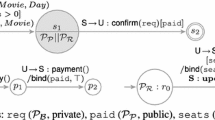Abstract
The ability to communicate is one of the salient properties of agents. Although a number of agent communication languages (ACLs) have been developed, obtaining a suitable formal semantics for ACLs remains one of the greatest challenges of multiagent systems theory. Previous semantics have largely been mentalistic in their orientation and are based solely on the beliefs and intentions of the participating agents. Such semantics are not suitable for most multiagent applications, which involve autonomous and heterogeneous agents, whose beliefs and intentions cannot be uniformly determined. Accordingly, we present a social semantics for ACLs that gives primacy to the interactions among the agents. Our semantics is based on social commitments and is developed in temporal logic. This semantics, because of its public orientation, is essential to providing a rigorous basis for multiagent protocols.
Preview
Unable to display preview. Download preview PDF.
Similar content being viewed by others
References
Austin, J.L.: How to Do Things with Words. Clarendon Press, Oxford (1962)
Breiter, P., Sadek, M.D.: A rational agent as a kernel of a cooperative dialogue system: Implementing a logical theory of interaction. In: ECAI 1996 Workshop on Agent Theories, Architectures, and Languages, pp. 261–276. Springer, Heidelberg (1996)
Conte, R., Castelfranchi, C.: Cognitive and Social Action. UCL Press, London (1995)
Dignum, F., van Linder, B.: Modelling social agents: Communication as action. In: Intelligent Agents III: Agent Theories, Architectures, and Languages, pp. 205–218. Springer, Heidelberg (1997)
Allen Emerson, E.: Temporal and modal logic. In: van Leeuwen, J. (ed.) Handbook of Theoretical Computer Science, vol. B, pp. 995–1072. North-Holland, Amsterdam (1990)
Fagin, R., Halpern, J.Y., Moses, Y., Vardi, M.Y.: Reasoning About Knowledge. MIT Press, Cambridge (1995)
Grice, H.P.: Logic and conversation. In: Cole, P., Morgan, J.L. (eds.) Syntax and Semantics, vol. 3. Academic Press, New York (1975) (Reprinted in [12])
Grice, P.: Utterer’s meaning and intentions. Philosophical Review (1969) (Reprined in [12])
Habermas, J.: The Theory of Communicative Action, vol. 1 and 2. Polity Press, Cambridge (1984)
Labrou, Y., Finin, T.: Semantics and conversations for an agent communication language. In: Proceedings of the International Joint Conference on Artificial Intelligence (1997)
Levesque, H.J., Cohen, P.R., Nunes, J.T.: On acting together. In: Proceedings of the National Conference on Artificial Intelligence, pp. 94–99 (1990)
Martinich, A.P.: The Philosophy of Language. Oxford University Press, New York (1985)
Midgley, G.: The ideal of unity and the practice of plurality in systems science. In: Flood, R.L., Romm, N.R.A. (eds.) Critical Systems Thinking: Current Research and Practice, Ch. 2, pp. 25–36. Plenum Press, New York (1996)
Rodríguez-Aguilar, J.A., Martín, F.J., Noriega, P., Garcia, P., Sierra, C.: Towards a test-bed for trading agents in electronic auction markets. AI Communications 11(1), 5–19 (1998)
Searle, J.R.: The Construction of Social Reality. Free Press, New York (1995)
Searle, J.R.: Mind, Language, and Society: Philosophy in the Real World. Basic Books, New York (1998)
Singh, M.P.: Multiagent Systems: A Theoretical Framework for Intentions, Know-How, and Communications. Springer, Heidelberg (1994)
Singh, M.P.: Agent communication languages: Rethinking the principles. IEEE Computer 31(12), 40–47 (1998)
Singh, M.P.: An ontology for commitments in multiagent systems: Toward a unification of normative concepts. Artificial Intelligence and Law (1999) (In press)
Smith, I.A., Cohen, P.R.: Toward a semantics for an agent communications language based on speech-acts. In: Proceedings of the National Conference on Artificial Intelligence, pp. 24–31 (1996)
Traum, D.R.: A reactive-deliberative model of dialogue agency. In: Intelligent Agents III: Agent Theories, Architectures, and Languages, pp. 157–171. Springer, Heidelberg (1997)
Venkatraman, M., Singh, M.P.: Verifying compliance with commitment protocols: Enabling open web-based multiagent systems. Autonomous Agents and Multi-Agent Systems 2(3), 217–236 (1999)
Verharen, E.M.: A Language-Action Perspective on the Design of Cooperative Information Agents. Catholic University, Tilburg (1997)
Walton, D.N., Krabbe, E.C.W.: Commitment in Dialogue: Basic Concepts of Interpersonal Reasoning. State University of New York Press, Albany (1995)
Winograd, T., Flores, F.: Understanding Computers and Cognition: A New Foundation for Design. Addison-Wesley, Reading (1987)
Author information
Authors and Affiliations
Editor information
Editors and Affiliations
Rights and permissions
Copyright information
© 2000 Springer-Verlag Berlin Heidelberg
About this chapter
Cite this chapter
Singh, M.P. (2000). A Social Semantics for Agent Communication Languages. In: Dignum, F., Greaves, M. (eds) Issues in Agent Communication. Lecture Notes in Computer Science(), vol 1916. Springer, Berlin, Heidelberg. https://doi.org/10.1007/10722777_3
Download citation
DOI: https://doi.org/10.1007/10722777_3
Publisher Name: Springer, Berlin, Heidelberg
Print ISBN: 978-3-540-41144-4
Online ISBN: 978-3-540-40028-8
eBook Packages: Springer Book Archive




